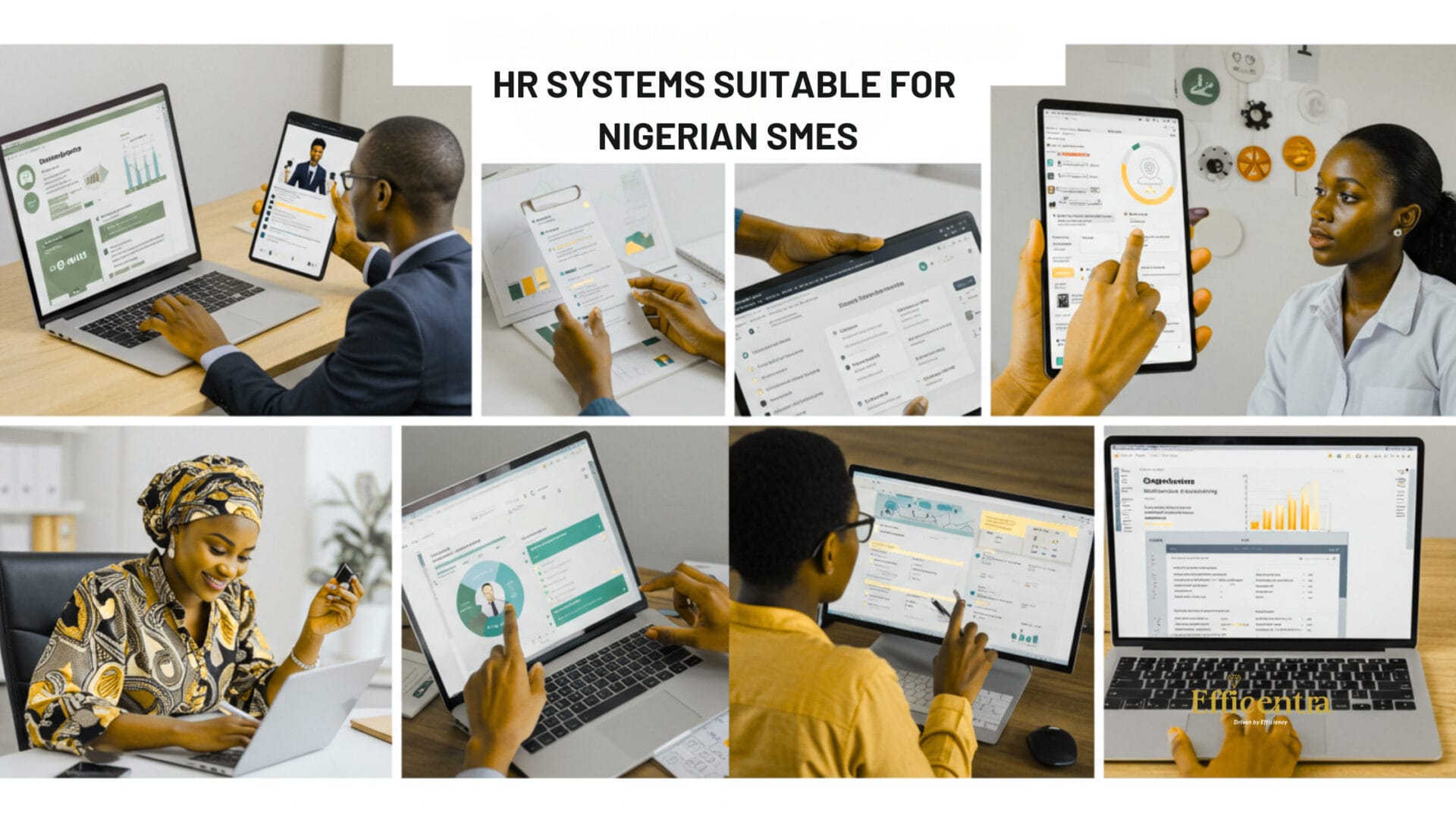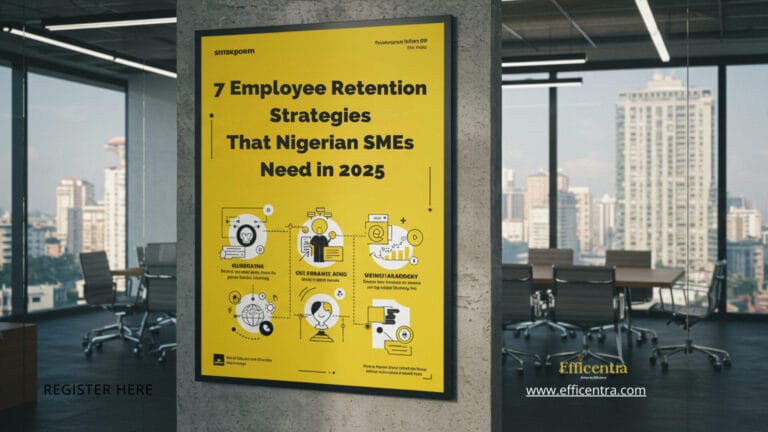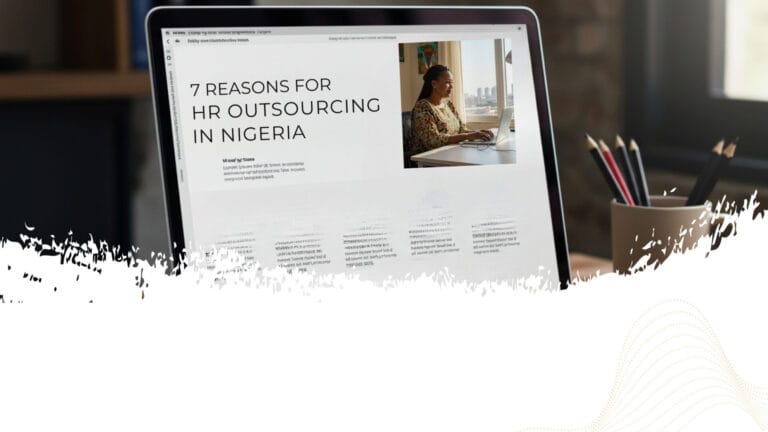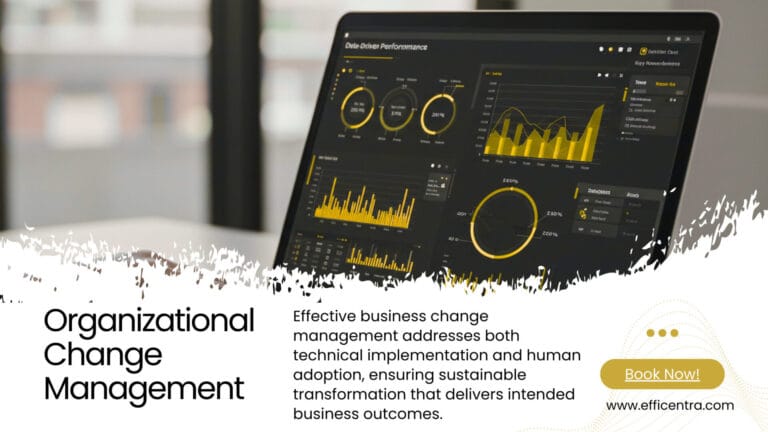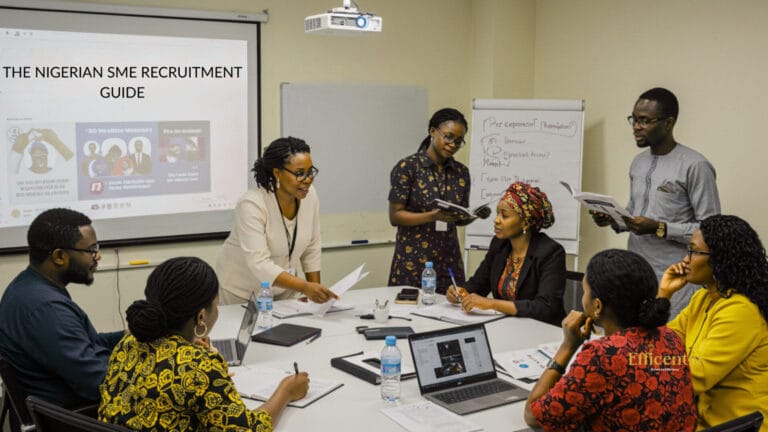HR Systems Suitable for Nigerian SMEs
Published: August 12, 2025 | Reading Time: 5-8 minutes | Author: Helen Solange, Efficentra
The panic call came at 11:47 PM on a Sunday night. “Madame Solange, our payroll system crashed again. We have 78 employees expecting salary tomorrow, and I’m manually calculating everything in Excel. This is the third breakdown this quarter. We need HR systems suitable for Nigerian SMEs that actually work.”
This Lagos fintech CEO’s nightmare perfectly illustrates why 73% of Nigerian companies outgrow their initial HR systems within 18 months. What worked brilliantly for 15 people becomes an operational disaster at 45 employees.
Here’s what most business owners don’t realize: Finding HR systems suitable for Nigerian SMEs isn’t just about handling more employees it’s about transforming HR from administrative burden into strategic business function. Companies that select the right systems don’t just survive growth; they accelerate it.
The good news? HR systems suitable for Nigerian SMEs now offer enterprise-grade capabilities at SME-friendly prices. Companies implementing strategic HR upgrades report average ROI of 340% within the first year, along with dramatic improvements in employee satisfaction and operational efficiency.
This guide reveals exactly how successful Nigerian SMEs select and implement HR systems that scale with ambitious growth plans rather than constrain them.
Why Nigerian SMEs Need HR Systems Suitable for Local Business Context
The 35-Employee Breaking Point
Every Nigerian business owner experiences this moment: processes that worked smoothly suddenly feel chaotic. This isn’t coincidence it’s mathematics.
At 15 employees: 105 potential relationship combinations at 35 employees: 595 potential relationship combinations, At 50 employees: 1,225 potential relationship combinations
Consider a Lagos-based software company (client name confidential). At 18 employees, leave requests took 2 minutes to approve. By 45 employees, leave management consumed 8 hours weekly and delayed project timelines. A critical product launch nearly failed because developers couldn’t get timely leave approvals.
Nigerian-Specific Challenges
Unlike international businesses, Nigerian SMEs face unique operational complexities:
Multi-State Compliance:
- Different state tax structures and requirements
- Varying pension fund administrator relationships
- Regional salary benchmarking needs
- Local government compliance variations
Cultural Considerations:
- Extended family obligations affecting benefits design
- Religious calendar integration for scheduling
- Hierarchical respect protocols in approval workflows
- Community-oriented recognition systems
Economic Context:
- High inflation affecting compensation planning
- Currency fluctuation impacts on international employees
- Economic stress indicators requiring employee support programs
How to Select HR Systems Suitable for Nigerian SMEs
Step 1: Assess Your Current Pain Points
Before evaluating systems, conduct an honest assessment of your HR challenges:
Time Audit Questions:
- How many hours weekly does management spend on HR tasks?
- Which processes require the most manual intervention?
- How often do HR errors disrupt business operations?
- What compliance violations have you experienced?
Growth Planning:
- What’s your projected headcount in 12-24 months?
- Will you expand to multiple locations?
- What new compliance requirements will you face?
- How will your reporting needs evolve?
Step 2: Define Your Non-Negotiable Requirements
Nigerian Compliance Essentials:
- Automated PAYE tax calculations
- Pension contribution management (8% employer, 10% employee)
- National Housing Fund tracking
- ITF and NSITF integration
- Multiple state tax jurisdiction handling
Scalability Features:
- Multi-location management capabilities
- Role-based access controls
- Customizable approval workflows
- Integration with business intelligence tools
User Experience Priorities:
- Mobile accessibility for Nigerian smartphone users
- Offline capability for unreliable internet
- Multi-language support where needed
- Intuitive interface for non-technical users
Step 3: Evaluate Leading Solutions
Nigerian-Built Platforms:
SeamlessHR
- Strengths: Complete Nigerian compliance, local support, proven scalability
- Best For: Companies prioritizing compliance accuracy and local expertise
- Consider If: You value local relationships and Nigerian-specific features
- Strengths: SME-focused design, affordable entry point, strong payroll
- Best For: Growing companies (15-40 employees) seeking value
- Consider If: Budget is primary concern but you need reliability
International Platforms with Nigerian Adaptation:
Zoho People
- Strengths: Comprehensive features, integration ecosystem, customization
- Best For: Tech-savvy companies requiring extensive integration
- Investment: ₦100K-₦350K monthly
- Consider If: You need platform flexibility and have technical resources
BambooHR
- Strengths: Exceptional user experience, strong performance management
- Best For: Companies prioritizing employee experience
- Investment: ₦180K-₦500K monthly
- Consider If: User adoption is your primary concern
Implementation Strategy: The 60-Day Quick Start
Days 1-20: Foundation Setup
Week 1-2: Data Preparation
- Clean and standardize existing employee data
- Document current HR processes and workflows
- Identify integration points with existing business systems
- Create data backup and security protocols
Week 3: System Configuration
- Set up organizational structure and reporting hierarchies
- Configure approval workflows based on company culture
- Customize forms and processes for Nigerian context
- Establish user access levels and permissions
Days 21-40: Testing and Training
Week 4-5: Comprehensive Testing
- Run parallel processing with existing systems
- Test all critical workflows with real scenarios
- Verify Nigerian compliance calculations and reporting
- Validate integration points and data accuracy
Week 6: User Training
- Train super-users on advanced system functions
- Conduct department-specific training sessions
- Create quick reference guides for common tasks
- Establish internal support protocols
Days 41-60: Go-Live and Optimization
Week 7-8: Phased Deployment
- Deploy core functions (payroll, employee database) first
- Add advanced features incrementally
- Monitor system performance and user adoption
- Address issues quickly to maintain confidence
Week 9: Performance Review
- Measure success against baseline metrics
- Gather user feedback and address concerns
- Optimize processes based on real usage patterns
- Plan next phase enhancements
ROI Calculation Framework
Direct Savings Analysis
Time Reduction Benefits:
- Payroll processing: 20 hours → 4 hours monthly = ₦120K savings
- Leave management: 8 hours → 1 hour monthly = ₦52.5K savings
- Compliance reporting: 12 hours → 2 hours monthly = ₦75K savings
- Total monthly savings: ₦247.5K
Error Reduction Impact:
- Payroll accuracy improvements = ₦180K monthly in correction avoidance
- Compliance violation prevention = ₦500K annually in risk mitigation
- Annual error reduction value: ₦2.66M
Business Growth Facilitation
Operational Efficiency:
- 50% reduction in time-to-hire enables faster capability building
- Manager time recovery allows focus on revenue-generating activities
- Improved employee satisfaction reduces costly turnover
Typical ROI Timeline:
- Month 1-3: 15-25% productivity improvement
- Month 4-6: 40-60% time savings in HR processes
- Month 7-12: 200-340% total return on investment
Success Implementation Examples
Case Study: Lagos B2B Startup
Challenge: 25-employee oil and gas servicing company struggling with manual payroll and compliance tracking
Solution: Implemented Zoho People with custom compliance modules
Results after 6 months:
- Payroll processing time: 18 hours → 3 hours monthly
- Compliance violations: 3 annually → 0
- Employee satisfaction: 6.2/10 → 8.7/10
- ROI: 178% in first year
Common Implementation Pitfalls and Solutions
Challenge 1: User Resistance
Problem: Employees preferring familiar manual processes Solution: Include employees in selection process, provide comprehensive training, and highlight personal benefits like easier leave requests and self-service access
Challenge 2: Data Migration Issues
Problem: Inconsistent or incomplete existing data Solution: Invest 20-30% of implementation time in data cleaning, use migration as opportunity to establish data quality standards
Challenge 3: Integration Complexity
Problem: Connecting with existing business systems Solution: Use middleware platforms like Zapier for simple integrations, plan for gradual integration rather than all-at-once approach
Challenge 4: Budget Constraints
Problem: Upfront investment concerns in uncertain economic environment Solution:
- Calculate monthly savings from current inefficiencies
- Negotiate vendor payment terms
- Implement in phases to spread costs
- Focus on ROI rather than just costs
Making Your Decision: Action Steps
Week 1: Assessment and Planning
- Complete internal HR process audit
- Calculate current costs of manual processes
- Define success criteria and timeline
- Secure leadership buy-in and budget approval
Week 2: Vendor Evaluation
- Request demonstrations from 3-4 shortlisted vendors
- Conduct reference calls with similar Nigerian companies
- Test systems with your actual data and workflows
- Negotiate terms and implementation support
Week 3: Implementation Preparation
- Select implementation team and project manager
- Create communication plan for organization
- Prepare data for migration
- Establish training schedule and change management approach
Conclusion: Your Competitive Advantage Awaits
Nigerian SMEs that implement suitable HR systems today gain sustainable competitive advantages: faster hiring, better compliance, improved employee satisfaction, and the operational foundation for aggressive growth.
The businesses dominating Nigerian markets over the next decade won’t be those with the biggest budgets they’ll be the ones with the smartest operational systems. HR systems suitable for Nigerian SMEs represent strategic investments that compound over time, creating capabilities that become increasingly difficult for competitors to match.
Your next hire, your next expansion, your next growth milestone all depend on having HR systems that enable rather than constrain your ambitions.
At Efficentra, we’ve guided over 200 Nigerian SMEs through this transformation. Companies achieving the greatest success treat HR system selection as strategic business decisions rather than administrative purchases.
Ready to transform your HR operations into a competitive advantage? The tools, knowledge, and support systems exist today to make this transformation both achievable and profitable.
Ready to find the perfect HR system for your Nigerian SME?
Book a free 30-minute consultation with our team. We’ll assess your current challenges and recommend the exact system that fits your business size, budget, and growth plans.
What you’ll get:
- Custom HR system recommendations for your industry
- ROI projection specific to your business
- Implementation timeline and budget planning
- Answers to all your compliance questions
Limited spots available each month.
Book Your HR Systems Consultation → Nigerian SME HR Solutions

Helen Solange is the Founder and Principal Consultant at Efficentra, Nigeria’s leading HR consulting firm for growing businesses. With over 15 years of experience in strategic people operations.

